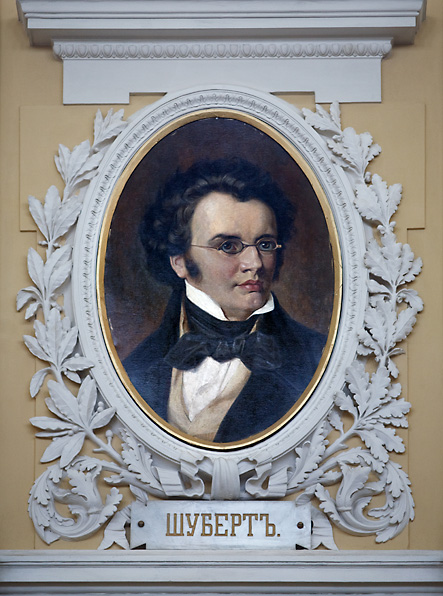

Franz Schubert (1797–1828) was an Austrian composer. In 1808–1812 he was a singer at the Vienna Court Cappella. He studied general bass with Wenzel Ruzicka and counterpoint and composition with Antonio Salieri. In 1814-1818 he worked as a schoolteacher’s assistant in the school where his father taught.
By the year 1816 Schubert had composed over 250 songs (including “Gretchen am Spinnrade” and “Der Erlkőnig”), four singspiels (German comic operas), three symphonies and other works. A circle of friends emerged around Schubert, admirers of his music – including Johann Michael Vogl, who became a performer of his songs). Recognition of Schubert’ music took place only during the 1820s.
Schubert was one of the first representatives of Romanticism in music. One of the most important places in Schubert’s music is taken up by the art song (or Lied) for voice and piano. Being one of the most prominent melodists in the musical repertoire, Schubert reformed this genre and created new types of song and vocal cycle. Schubert’s vocal compositions were written on the texts of many poets, including: Johann Wolfgang von Goethe, Friedrich Schiller, Wilhelm Műller, Ludwig Rellstab, Friedrich Rűckert and William Shakespeare.
Schubert’s instrumental music is especially noteworthy for its musical themes of song-like character. The composer established the tradition of free romantic rendition of the classical symphony, music for chamber ensemble and the sonata; he created new genres of small-form Romantic piano pieces – impromptus and moments musicaux, and also poeticized the genres of such dances as the waltz, the landler and the ecossaise.
The music of Schubert is connected with Austrian folk art, with the traditions of domestic music-making. During his lifetime the composer gained recognition, first of all, with his songs. Many of his large-scale compositions were performed for the first time after his death.
His compositions include operas, incidental music for the theater; works for soloists, chorus and orchestra; music for orchestra: the symphonies (including the “Unfinished Symphony” and the “Great Symphony”) and overtures; works for chamber ensembles (most notably, the “Trout Quintet”), sonatas for piano and four-hand piano, fantasies (including the “Wanderer” Fantasy), impromptus, moments musicaux, rondos, variations and other pieces; songs for voice and piano, including the song cycles “Die Schöne Müllerin”, “Der Winterreise” and “Der Schwanngesang,” as well as numerous separate songs and works for vocal ensembles.